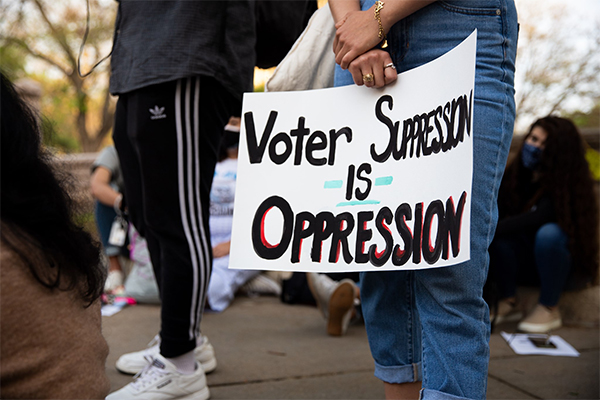Voter suppression is a giant step toward open dictatorship
As the movement for real change and real democracy in America grows, some powerful people and corporations are feeling threatened by even a limited democracy, and they would prefer this country be put under a corporate dictatorship of one form or another. The central battlefield where this struggle between democracy and dictatorship is being waged is the electoral arena, including around the right to vote.
One tactic is simply purging voters from the rolls. At least 17 million voters were purged nationwide between 2016 and 2018. Many don’t know they have been purged until they show up to vote.
Another tactic is gerrymandering voting districts to disenfranchise certain voters, especially the poor and voters of color, during the redistricting process, which is under way this year.
Another approach is U.S. Supreme Court decisions that limit the federal government’s power to protect voting rights.
Another tactic is passing voter suppression laws that erect unnecessary barriers for people to register to vote, vote by mail, or vote in person. Public Citizen reports that since 2015, corporations in the United States have given $50 million to the state lawmakers supporting voter suppression bills. Hundreds of anti-voter bills have been introduced in the states in recent years (425 just this year so far), and dozens have been passed, often under the guise of “fighting election fraud.”
According to the Brennan Center for Justice, between January 1 and September 27, 2021, at least 19 states enacted 33 laws that make it harder for Americans to vote, and these are typically states where voting was already difficult. States that have passed restrictive voting laws are concentrated in the South and the intermountain West.
Texas is a case in point, having recently passed SB 1, one of the most comprehensive and onerous voter suppression bills in the country. New York Times columnist Charles Blow described this legislation in an Oct. 13 article, where he noted that “the law bans drive-through voting and 24-hour voting, which were used by nearly 140,000 voters in Harris County — which is about 44 percent Hispanic and 20 percent Black — during the 2020 election.”
Blow also noted that the law “prohibits election officials from sending absentee ballots to all voters, regardless of whether they had requested them; bans using tents, garages, mobile units or any temporary structure as a polling location; further limits who could vote absentee; and adds new identification requirements for voting by mail. Partisan poll watchers would also have more access and autonomy under the bill’s provisions, and election officials could be more harshly punished if they make mistakes or otherwise run afoul of election codes and laws.”
Blow said about redistricting, “Texas stands to gain two new congressional seats because its population grew, according to the latest census. And although 95 percent of that growth was due to people of color, the Republican-led legislature is working on new maps that would increase the power of white Republicans in the state and reduce the power of people of color.” This in a state that is only about 40% white.
Blow said that Texas “is a leader in oppression. It is institutionalizing and legalizing racism, misogyny and transphobia. The Lone Star State is hardly alone in its oppressive ambitions. Other states are watching and waiting, poised to follow its lead,” including by replicating the Texas blueprint for abortion restrictions. “We can look forward to some of those states mimicking Texas on voter restrictions, as well. In this way, Texas is a harbinger of doom, it is the leading edge of regression …” Blow concluded.
As the fight in Texas shows, the rights of American voters are vulnerable precisely because voting is regulated at the state level. But there are two bills now before Congress that would impose — or reimpose — some national standards designed to protect the right to vote.
One is the John Lewis Voting Rights Advancement Act. Proposed by Senate Democrats, it would restore the power of the federal government to oversee state voting laws to prevent discrimination. U.S. Supreme Court rulings in 2013 and 2021 made it harder for plaintiffs alleging discrimination to challenge state voting laws under the federal Voting Rights Act. The House passed its version of the John Lewis Act in August. In the Senate, Joe Manchin of West Virginia is the only Democrat to not sign on as a cosponsor, although he has said he supports the bill. Senate Republicans oppose it.
The other bill originated as the For the People Act, which, according to its sponsor, Sen. Amy Klobuchar, would “restore the promise of American democracy by addressing voter intimidation and suppression, ending the corrupting power of dark money in campaigns, putting an end to gerrymandering, and strengthening ethics laws.” The bill passed the House more than six months ago, but Republicans were able to block it in the Senate this summer because Joe Manchin refused to support it. Manchin and Klobuchar have since agreed on a weaker “compromise” bill, the Freedom to Vote Act. Among other things, the act would set uniform national policies on mail-in ballots, early voting and voter registration, which vary widely across states. Republicans still oppose it.
In a recent interview on MSNBC, the Rev. Dr. William Barber, co-chair of the Poor People’s Campaign, described how the original For the People Act has been watered down into what is now called the Freedom to Vote Act. Here are excerpts from his remarks:
“What Manchin has done is painted a lot of Republican positions into the bill. There are a lot of things in this bill that ought to be amended out… First of all, the bill’s name is Freedom to Vote. We don’t have a freedom to vote, we have a right to vote. That should be amended. Secondly, this is the first time in history we would have codified voter ID as necessary for election integrity. That’s straight Trumpian, Republican language. That should not be in the bill because it’s not true. A signature attestation is what has worked and what should be there. What we see is he [Manchin] is slowly putting different things in that come straight out of Republican lingo. And guess what? He said that he supported, before, the For the People Act. He was a signatory [on that bill] when John Lewis was alive. When John Lewis died and the Senate changed, all of a sudden he changed and he’s not making any commitment to ending the filibuster. So he’s got them negotiating on something that may not even pass, because he’s never going to break the filibuster.
“… I’m deeply concerned how he’s allowed them to split these things. You know, the Democrats should have started this messaging — they should have had the faces and the voices of people who would be impacted. We tried to say this to the handlers of the president at the White House, and for some reason they didn’t get it.
They should have never let voting rights just be a black issue, and then separated it out from the economic issue. They should have had people whose lives were being impacted [tell their stories]. Both the people whose lives will be impacted by the Build Back Better plan — you know, the women, the mothers, the children, the workers, the people at risk for climate difficulty — and the people who would be impacted by voter suppression, because it’s not just black people. The laws that these state legislators are trying to put in place would affect 56 million Americans who used things like mail-in ballots and same-day registration and early voting in the last election. We should have made this a matter of democracy. Now we have time to do it, but I’m afraid that what has happened is people have gotten caught up in, is this Manchin’s bill or Biden’s bill, is it $3 trillion or $4 trillion…rather than what’s the impact, who will it affect, who will it hurt? How will it further the democracy?… Poor and low-income voters represent 30% of the electorate, and voter suppression will hurt poor and low-wealth people of every race, creed, and color. Not to pass voter protection, and not to pass some kind of investment in poor and low-wealth communities is economically insane and politically incompetent.”
Voter suppression is a giant step toward open dictatorship
Elections have real consequences, in terms of what kinds of laws get passed, whose voices get heard, and whose don’t, what kinds of decisions are made by the courts, who gets resources for their communities, and so on. The right to vote must be seen as sacred, and protecting it is a key part of staving off a dictatorship and advancing toward a real democracy. The movement must increase the pressure in the streets, both to stop the voter suppression at the state level, to force the Senate to end the filibuster and pass strong federal voting rights bills. Passing these bills won’t mark the end of the struggle, but it will be a needed victory in the long fight that lies ahead.




[…] longer version of this editorial was published in our sister publication, the People’s Tribune in its October/November […]
[…] publicó una versión más larga de este editorial en nuestra publicación hermana, People’s […]